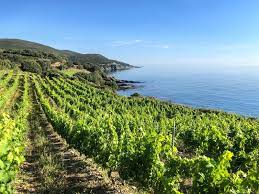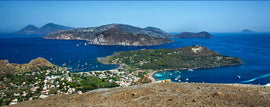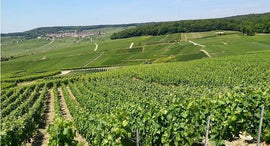This month we are featuring two rosés from Corsica, the fourth largest, and most mountainous, island in the Medditeranean. Once ruled by the Italian republic of Genoa, Corsica enjoyed a brief period as an independent democratic republic from 1755-1769, during which it was responsible for the world’s first (remarkably progressive!) written constitution. France then consolidated control over the island just in time for its most famous son, Napoleon Bonaparte, to be born there a French subject. And while Corsica has existed under French sovereignty ever since, it is a world of its own, not least when it comes to wine. The island’s vitilculturual tradition stretches back millenia, incorporating French and Italian influences, but remaining stubbornly itself. Today, Corsica has nine AOCs across all its idiosyncratic micro-climates, and rosé accounts for 70% of all wine production. Here are two of our favorites, made from Corsica’s two primary indigneous red varietals, Niellucciu (nee-el-LOO-choo) and Sciacarellu (shack-a-REL-lu).
In 2005, Eric Poli bought 7.4 acres of old-vine Nielluccio and Vermentino in the heart of Patrimonio, the oldest and arguably best appellation on Corsica. He also bought 108 acres outside of Linguizzetta, his hometown on the east coast of the island. Protected by the maritime influences of the Golfe de Saint-Florent, vines cultivated on the limestone soils of Patrimonio’s hillsides rarely require treatments of any kind, so Eric’s practices are essentially organic (though without certification). Nielluciu, genetically linked to Sangiovese, thrives in this ideally situated inlet at the north end of the island, and when yields are limited, results in wines with more freshness and finesse than those made from its Tuscan cousin.
High in the foothills of Monte Grossu mountain, inland from the Calvi AOC on the northwest coast of Corsica, lies the granite plateau of Reginu, an area long known for U Vinu di E Prove – the wine of the Prove, as the micro-climate is known. The plateau has been continuously used for vine and olive growing for centuries, and was once the site of a major olive pressing operation that supplied a large part of France with its olive oil. In 1945, when the owner of the olive oil mill packed up and moved his operation to colonial Algeria in search of bigger land and greater profits, Roger Maestracci saw a golden opportunity and moved in. Within a few years the domaine had established a firm reputation in the area, and when it came time for Roger to retire in the early 1980’s, he passed along the reins of the domaine to his son-in-law, Michel Raoust, who has since handed over the winemaking and winery management to his daughter, Camille-Anaïs Raoust.
Think Pink!
Carrie Upson
General Manager
|
Region/Country of Origin: Corsica, France |
About the Winemaker: After graduating in Finance, Eric Poli started his career in Paris in 1993… on the trading floor! So how did the young trader end up in Corsica on the family farm three years later? "It's a difficult feeling to explain. It must be our island upbringing that connects us, subconsciously, to this land..." he says thoughtfully. Eric, his father, Angelo, and his brother Antoine produce their own wine and established the Domaine de Piana in 1996. In the space of the following decade, Eric expanding his estate, producing Vins de Pays, near Bravone. In 2005, Yves Leccia, a winemaker in the Patrimoniu region, told him that 7 acres were up for sale in Oletta. Le Clos Alivu was born! About the Winemaking: Total destemming. Temperature-controlled cuvaison of approximately three weeks. Selected yeast from Corsica Institute is used for the whites and rosés. Fermentation for all wines takes place in temp-controlled stainless-steel tanks. The rosés are produced entirely from direct press juice. No malo-lactic fermentation occurs for whites and rosés. All wines are bottled with light plaque filtration. Tasting Notes: Penetratingly pungent herbal scents including thyme and lavender link up with white peach and pink grapefruit on a luscious and refreshingly juicy palate, leading to a long finish replete with reprises of the high-toned and pungent herbal essences that already lent the nose such striking distinction. |
|
Winemaker: Eric Poli |
|
|
Price: $17 btl/ $183.6 case |
|
|
Suggested Food Pairing: Great pairing with Mediterranean dishes such as: lamb stew, pasta in sauce, sea bass and halibut.
|
|
|
Region/Country of Origin: Corsica, France |
About the Winemaker: After earning a degree in engineering and oenology in Montpellier in 2009, Camille Anaïs Raoust took over the 30 hectares of Domaine Maestracci from her father in 2015 and converted the family estates to biodynamic winemaking. She says: “When I found myself in charge of the property, I knew I wanted to bring something new to it and I immediately understood the amount of work to be done. We have always worked with the utmost respect for the land and its natural cycle...But biodynamics goes even further with regards to the knowledge of one’s terroir and the development of unique techniques. This is what I aspire to today!” About the Winemaking: All grapes picked by hand. Niellucciu and Sciaccarellu are co-planted in the same parcel and vinified together. Made by 90% direct press,10% saignée. Wine aged in stainless steel. 40% Niellucciu, 40% Sciaccarellu, 20% Grenache from 50 years old vines. Tasting Notes: Classic Corsican notes of wild herb, red berries and granite minerality on the nose and palate, and a brisk, brine-kissed finish. |
|
Winemaker: Camille-Anaïs Raoust |
|
|
Price: $23 bottle/$248.4 case |
|
|
Suggested Food Pairing: Charcuterie, Bouillabaisse, Eggplant Bonifacio
|
|





